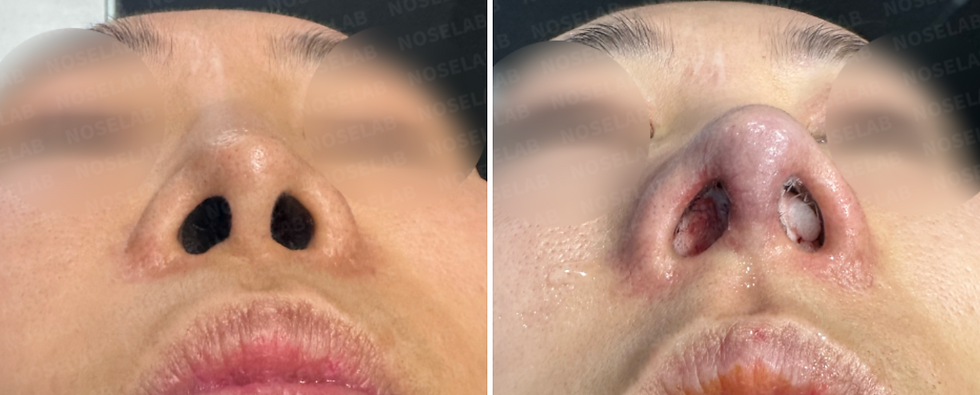Hello, this Dr. Chayoung Kang, Director of Noselab Rhinoplasty Clinic. Today, we will introduce the rhinoplasty case of a patient who was concerned regarding a long and flat nose.
This patient had previously undergone 2 rhinoplasty surgeries.
The part that the patient wanted to change the most was the lenght of her nose. She wanted a shorter-looking nose, and to solve the issue of the excessively exposed nostrils, which made this case require a delicate approach.
Medical History
2 years prior: septoplasty + ear cartilage graft + silicone implant
6 months earlier: silicone implant replacement
Preoperative Design Consultation
Frontal view:
Excesively exposed and asymmetrical nostrils.
Deviation to the left
High glabella starting point
45-degree view:
Long-looking nose
Sagging columella and excessively visible nostrils
Bumpy nasal bridge
Side profile view:
Flat and long nose
Lack of three-dimensionality
Small nasolabial angle (less than 90 degrees)
Long philtrum and protruding mouth
Nostrils:
Noticeable nostril asymmetry
Columella tilted to the left
Patient's main requirements
The goal was to make the nose look shorter. However, there is a problem where the nostrils are very visible from the front, because generally, the tip of the nose should be corrected to make it longer. However, the patient definitely did not want her nose to look longer, so we decided to design it to be shorter, even if the nostrils were somewhat visible.
Based on these decisions, the following surgical plan was established:
a) Septal extension surgery using autologous costal cartilage (considering septal reconstruction surgery if necessary)
b) After removing the existing silicone implant, insertion of a new silicone implant only in the
area that is required on the nasal bridge.
c) Nasolabial angle correction to minimize the mouth protrusion.
d) Septal extension, alar cartilage repositioning and cartilage tying for correction of the nostril asymmetry
e) Lower the glabella starting point to make the nose look shorter.
Before and After Surgery Photos
Improvemeny of the nostril asymmetry
Straightening of the previously deviated nose
Lowering of the glabella to make the nose look shorter.
Adjustment of the lenght of the nose
Reduced the exposure of the nostrils by pushing the saggy columella upwards
Changed the bumpy nose bridge into a smooth shape.
The plain and flat nose bridge was made into a straight shape.
Improvement of the nasolabial angle and mouth protrusion.
Improved the issue of the long philtrum.
Improvement of the nostril asymmetry
Straightening of the previously tilted columella.
After Surgery Table Photos
Overview
This case showcases the importance of the harmony between determining the patient's requirements and the medical aspect. In the case of the excessively visible nostrils, it is ideal to correct them by lenghtening the nose tip. However, this patient did not wish to make her nose any longer, we tried to carefully follow her requirements as much as possible in order to achieve the best results.
By lowering the glabella starting point between, we were able to create an effect that made the nose look shorter overall, while at the same time improving other problems such as nostril asymmetry and protruding mouth. Septal extension surgery using autologous costal cartilage played a major role in increasing the structural stability of the nose and correcting nostril asymmetry.
This case study once again demonstrates the importance of listening to the patient's needs and harmoniously combining these with medical judgment in rhinoplasty surgery.
Conclusion
When doing cosmetic surgery, there is always a problem when the patient's request and the doctor's standards do not match. Since the nostrils are visible from the front, it is clear that the tip of the nose should be corrected to make it longer, but if the patient is very sensitive about the lengthening, should we follow the doctor's opinion or accept the patient's request? This is always a dilemma.
In the past, doctors would perform surgeries based on their own convictions, but these days, they seem to listen more to the patient's needs. However, at the same time, they try to explain the problems that may arise in as much detail as possible before the surgery. Ultimately, I think that's because the goal of plastic surgery is to increase subjective satisfaction.
I hope this case was helpful to those who are concerned about their flat nose or long nose. Rhinoplasty is not simply about changing the shape of the nose, but is a complex process that must consider the harmony of the entire face. Therefore, it is important to find the method that is best for you through sufficient consultation with a specialist.
Through a comprehensive approach that simultaneously considers functional and cosmetic improvements, we aim to create beautiful noses that breathe easy.
With Noselab Clinic you can achieve a beautiful and healthy nose!
Thank you.
WHERE TO FIND US










Comments